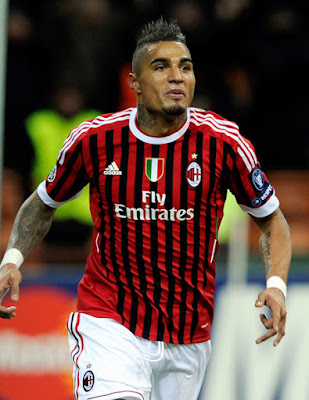 |
| Milan's Zlatan Ibrahimović roars at and through the competition |
Sulley Ali Muntari's goal that was not given--sorry, that was taken away after being given--last weekend against Juventus urged Milan's no. 2 Adriano Galliani to leave the San Siro because of high blood pressure. Not before, however, him making sure that his precarious systolic and diastolic balance was upset completely.
"Look what happens when you cry," he is reported to have said to Juventus coach Antonio Conte in the tunnel. "It clearly works."
"What a pulpit--you people are the mafia of football," was Conte's response.
Galliani was referring to Juventus's sustained self-victimization before the game last weekend, which everyone is guilty of is in Serie A at one point or the other. Conte was referring to the perceived influence Milan have had in Italian football, the kind of influence that Juventus have also had, and the kind that Juventus have exerted shamefully in the past (Calciopoli and all that). The notorious, erstwhile duopoly of Italian football arguing over injustices is not a very edifying moment, and not a moment that the Catanias and the Chievos should have any time for.
Comically, the 1-1 draw last weekend, during which Milan outplayed Juventus for most of the time, sobered Conte. After realizing how undeserved the draw was (even considering Alessandro Matri's goal that was perhaps disallowed correctly), the Juventus coach spoke of a need for sensibility all around when talking about officiating. It was a bit like being lectured on safe environmental practices by a suit at British Petroleum.
However, mainly for the better of public appearances, Galliani and Juventus president Andrea Agnelli made up over the phone.
Against such a backdrop, Milan coach Massimiliano Allegri deemed the trip to Palermo yesterday as being critical to the season. It was a game that would show what Milan are made of. The sense of injustice in the Milan camp was feverish--and poor Palermo were incinerated.
I haven't seen Milan play that kind of football since 2005. Palermo were marginalized to the point of being spectators. The Milan defence and midfield got to every ball first, and Robinho and Zlatan Ibrahimović did the rest. Ibra's hat-trick in the space of fourteen devastating minutes underlined Milan's rage and the Swede's centrality to this Rossoneri side. Really, it seems pathological to deny how vital Ibra is to this team, and there are many out there who think he is a liability due to his disciplinary problems. But surely he more than makes up for it, and perhaps we can see the time he spends suspended as well-deserved rest.
Returning after serving a harsh three-match ban, Ibrahimović went to work, dismantling Palermo. The hat-trick came from both feet, and was a display of precision and understated power. He was unplayable, unstoppable, and unforgiving.
"I still think about that Juventus game," he said after the match. Clearly. Like a Bollywood hero driven by revenge and a soundtrack, Ibra smashed his way through Palermo, flaying pink flamingos at the Renzo Barbera, which is not the happiest hunting ground for Milan.
 |
| Chievo celebrate as Juventus deflate |
Of course, sometimes perceived injustice can be the best spur. There is no conspiracy against anyone, and I say that even after the lurid scandal of 2006. However, what Conte has lost in the last week is his ability to moralize, and his team have lost the ability to win.
Almost three hours after Milan's proclamations of power, Juventus dropped two valuable points against Chievo in a 1-1 draw. At home. They have picked up just seven points out of the last fifteen on offer. And they have all sorts of tough games ahead, while Milan have a much easier schedule. The Bianconeri are undefeated this season, but they have drawn 12 games, one less than the amount they have won.
"People forget where we came from," said Conte after the draw yesterday. "Last summer there was talk of us ending up sixth, and now look where we are."
That won't cut it with the jeering Juventus fans, who whistled the team after the game yesterday. As for Milan fans, they can thank Boukary Dramè for the late drama yesterday. At 1-0 Juventus looked like they would see a win through to the end, but then Dramè shot past Gianluigi Buffon, and Juventus defender Leonardo Bonucci did the rest by deflecting the ball in the goal.
Milan are now three points ahead of Juventus, who have a game in hand against Bologna. After a week of talking about officials and phantom goals, it was heartening to be reminded that the players can still boss this Scudetto showdown. And there is no bigger boss than Ibra.












